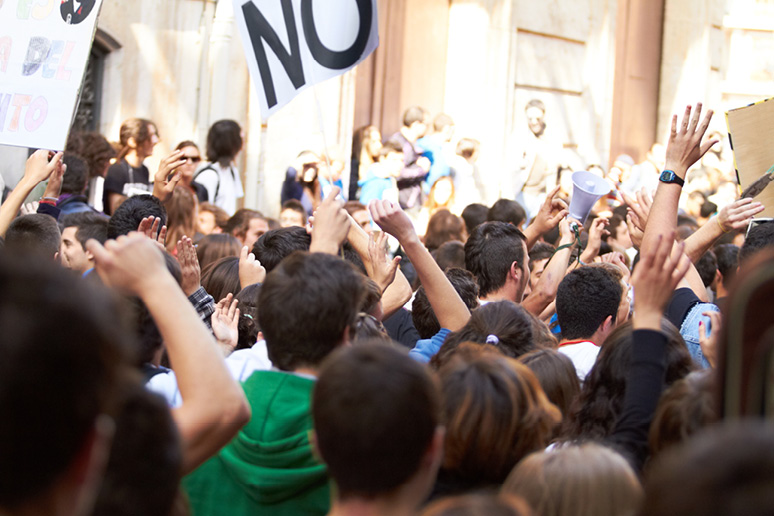Some acts are obviously criminal in nature. We know, for example, that it’s against the law to drive while drunk, rob a bank, or murder someone. But what about shouting on a residential street late at night or blocking traffic during a peaceful protest? States and municipalities limit what people can do in an effort to maintain peace and calm within these communities. When people disturb this peace and calm, their behavior may cross the line from annoying to criminal.
Disorderly conduct is one of the most commonly filed charges in any state or municipality. From drunk, rambunctious 20-year-olds at a football game to public urination, disorderly conduct often involves public conduct that wouldn’t be criminal if done in private or under different circumstances. Shouting in a neighborhood at noon, for example, may be a non-issue, whereas shouting in the same spot at 3 a.m. could escalate to a criminal offense.
Disorderly conduct is generally categorized as public behavior that is likely to cause a reasonable person or people to feel alarm, annoyance, or anger. Although disorderly conduct usually applies to behavior that occurs in public, even private behavior may be considered disorderly conduct if it affects the public. For example, screaming in your home at night (private) may disturb the neighbors (public). Disorderly conduct laws vary from state to state and even among different municipalities in the same state, but they are almost always charged as a misdemeanor offense. To illustrate, a recently passed bill in South Carolina erases disorderly conduct charges from first-time offenders under certain conditions.
If you are facing a disorderly conduct charge, even if you feel the infraction was minor, you should contact a criminal defense attorney immediately.
Common types of disorderly conduct
The term disorderly conduct encompasses a vast array of behaviors. However, the most common include:
- Bar room brawls and physical scuffles—More serious fighting may result in assault and battery charges, if someone is seriously harmed.
- Disruptive protests—Of course, the purpose of a protest is to disrupt a normal course of action that is found to be unjust. However, when the level of disruption potentially endangers the safety of the general public (for example, blocking large quantities of traffic from crossing a major thoroughfare) it can be charged as disorderly conduct.
- Public urination—This has been decriminalized in some states.
- Public intoxication.
- Public masturbation—In addition to up to 12 months in jail and a hefty fine, public masturbation can also lead to inclusion on the sex offender registry.
- Threatening or shouting at a police officer.
Fortunately, most first-offense disorderly conduct charges don’t result in jail time. However, if you have a criminal record or the circumstances of your arrest were particularly egregious, you may see time behind bars. If you are facing charges for disorderly conduct, an experienced criminal defense attorney can help you determine how to proceed.
Jail
Jail time for a conviction of disorderly conduct is typically short, though state laws can allow for up to a year for a misdemeanor conviction. While many disorderly conduct convictions involve no jail time, especially for first-time offenders, courts often suspend a jail sentence or order a person to “time served,” meaning the jail sentence is satisfied by the time the person already spent in jail after the initial arrest. For repeat offenders or more serious instances of disorderly conduct, short jail terms of several days, weeks, or even months are possible. Felony convictions bring with them the possibility of a year or more in state prison.
Your criminal history will also play a role in your sentencing. Previous offenses, coupled with the circumstances of your arrest, could lead to a harsher sentence.
“As with all criminal offenses, the court’s going to look to determine whether or not there’s a criminal history, and if that history, coupled with the disorderly offense gives the court concern that a fine or probation is not going to punish the defendant and protect the community, that may cause them to believe that only a jail sentence would,” says Ian N. Friedman, a criminal defense attorney with Friedman & Nemecek. “So, someone with an extensive history or the circumstances surrounding the offense are egregious, or could have even been charged higher but were not, that may cause a judge to impose some sort of jail sentence.”
Fines
Fines are a very common punishment for disorderly conduct convictions. Fines range widely, from as little as $25 to $1,000 or more. In many situations, courts impose a fine instead of jail or probation, though a fine may also be included with a jail or probation sentence. If you are unable to pay the fine, the courts will often allow you to make incremental payments under a payment plan. If after the payment plan has concluded you are still unable to pay the full amount, you may have to serve additional time in jail, or a property lien may be applied to your taxes or wages.
Probation
Probation sentences are a common sentence for disorderly conduct charges. A court can sentence a person convicted of disorderly conduct to several months or more of probation. If the person violates probation by, for example, committing another act of disorderly conduct, the court will likely impose a more significant penalty, such as a jail term or a higher fine.
What are your options?
If you have been charged with disorderly conduct, it is in your best interest to consult with an experienced criminal defense attorney immediately. Although the penalties for disorderly conduct are rarely significant, a criminal record can hurt your ability to get housing or a job for years into the future.
“When people call me and they ask, ‘should I get a lawyer?’ I always tell them that if I had a family member who had to go to court for any criminal matter, there’s no way that I would let them go without a lawyer,” Friedman says. “So if that’s the advice I would give my family, that’s the advice I would give anyone.”
As a relatively minor criminal offense, disorderly conduct charges can sometimes be expunged, or hidden, from your record. A skilled criminal defense attorney can help you determine if you qualify for expungement.
 By Amy Carst,
By Amy Carst, 

